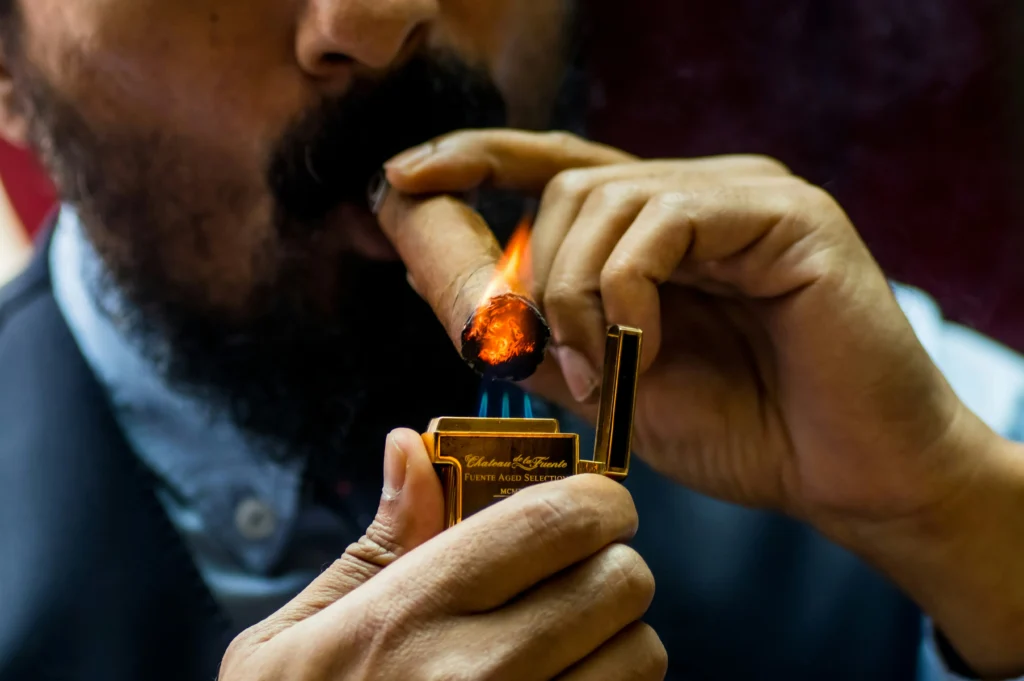Cigars have long been associated with sophistication, celebration, and moments of leisure. Whether it’s a toast to a milestone or simply unwinding after a long day, cigars offer a unique smoking experience.
But for those new to cigars or curious about their effects, there’s one common question: Do cigars give you a buzz? The short answer is yes.
This article will explore the cigar buzz in detail—what it is, how it works, and the factors that can influence it. Let’s dive in.
The Cigar Buzz Explained
A cigar buzz is often described as a mix of relaxation, euphoria, and heightened focus. This feeling comes primarily from nicotine, the naturally occurring chemical in tobacco leaves.

When you smoke a cigar, nicotine enters your bloodstream through the mouth and palate rather than the lungs, which sets cigars apart from cigarettes. Once absorbed, nicotine triggers the release of dopamine and norepinephrine in the brain:
- Dopamine: This neurotransmitter induces feelings of pleasure, calm, and happiness, creating the relaxing aspect of the cigar buzz.
- Norepinephrine: This chemical promotes alertness and focus, giving the buzz an uplifting and energizing edge.
Unlike cigarettes, which deliver nicotine rapidly through lung absorption, cigars provide a slow, steady nicotine delivery. This results in a more gradual and long-lasting buzz, making cigars a more leisurely and contemplative smoking experience.
How Long Does a Cigar Buzz Last?
The duration of a cigar buzz varies based on several factors, but generally, it can last anywhere from 30 minutes to several hours. This extended buzz is tied to nicotine’s half-life, which is approximately two hours.
As time passes, nicotine levels in your bloodstream gradually decrease, causing the buzz to fade. The tapering effect allows for a smoother decline compared to the sharp drop often associated with cigarette smoking.
The type of cigar you smoke and the amount you consume significantly affect how long the buzz lasts. Larger cigars with higher nicotine content deliver a longer buzz, while smaller, milder cigars provide a shorter, less intense experience.
Cigar Buzz vs. Cigarette Buzz
Cigars and cigarettes both deliver nicotine, but the experience is markedly different:
- Nicotine Content: A single cigar contains 100 to 200 milligrams of nicotine, compared to 8 to 12 milligrams in a cigarette. This makes cigars far more potent.
- Buzz Duration: The slow-smoking nature of cigars means the buzz is longer and more sustained. Cigarette buzzes are quicker and shorter due to rapid nicotine absorption.
- Smoking Style: Cigarettes are often inhaled, leading to a sharp nicotine spike. Cigars are smoked slowly, allowing nicotine to absorb gradually through the mouth, enhancing the savoring experience.
Cigar smoking emphasizes the journey—the rich flavors, the slow burn, and the ritual itself—whereas cigarettes often focus on immediate nicotine delivery.
Factors That Affect the Cigar Buzz

The intensity and duration of a cigar buzz can vary widely, depending on several personal and external factors. Let’s break down the key elements that influence this experience.
Nicotine Tolerance
For new or infrequent smokers, even a small amount of nicotine can lead to a pronounced buzz. Regular cigar smokers, however, develop tolerance over time, which means they may require stronger cigars or larger amounts to achieve the same effect.
Amount Smoked
The longer you smoke a cigar, the more nicotine you absorb. Smoking the entire length of a cigar will result in a stronger buzz than smoking only half.
Type of Cigar
Cigars vary in strength and nicotine content. A milder cigar made from lighter tobacco leaves delivers a gentler buzz, while a full-bodied cigar packs a stronger punch.
Smoking Technique
Cigars are designed to be savored, not inhaled. Puffing gently and taking your time enhances the flavor and provides a smoother buzz. Inhaling cigar smoke can lead to discomfort or an overwhelming nicotine rush.
Smoking Environment
The setting can influence your experience. Smoking outdoors allows the smoke to dissipate quickly, creating a lighter sensation. Indoor environments may intensify the aroma and the buzz. Consider using air purifiers or smoke eaters for a more comfortable environment.
Managing Your Cigar Buzz
While enjoyable, a cigar buzz can sometimes lead to unpleasant side effects if you’re not careful. Common issues include dizziness, nausea, and an increased heart rate. Here’s how to manage the buzz effectively:
- Choose Lighter Cigars: Start with a milder cigar if you’re new to smoking.
- Smoke Slowly: Take your time, and avoid rushing through the experience.
- Monitor Your Time: Limit how long you smoke to avoid overexposure to nicotine.
- Stay Hydrated: Drinking water helps counteract nicotine’s effects and keeps you feeling balanced.
By following these strategies, you can enjoy the buzz without overdoing it.
Enjoying the Cigar Buzz Responsibly

The cigar buzz is a unique and pleasurable experience. It offers a blend of relaxation, focus, and sensory enjoyment that’s hard to replicate. However, moderation is key. Smoking cigars responsibly ensures the experience remains enjoyable without leading to discomfort or dependency.
Cigars are best enjoyed as part of a ritual—whether paired with a favorite drink, celebrated with friends, or savored alone in a moment of reflection. The key is to find your balance and enjoy the process.
Final Thoughts
So, do cigars give you a buzz? Absolutely. The experience is distinct and offers a combination of relaxation and focus that many cigar smokers enjoy. Factors like the type of cigar, smoking technique, and individual tolerance play a big role in shaping the buzz.
As you explore the world of cigars, remember to savor the moment, appreciate the flavors, and smoke responsibly. With the right approach, cigars can become a relaxing and enjoyable part of your routine.

Leave a Reply